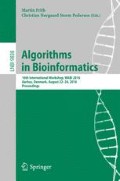Abstract
We address the problem of finding a minimum-size set of k-mers that hits L-long sequences. The problem arises in the design of compact hash functions and other data structures for efficient handling of large sequencing datasets. We prove that the problem of hitting a given set of L-long sequences is NP-hard and give a heuristic solution that finds a compact universal k-mer set that hits any set of L-long sequences. The algorithm, called DOCKS (design of compact k-mer sets), works in two phases: (i) finding a minimum-size k-mer set that hits every infinite sequence; (ii) greedily adding k-mers such that together they hit all remaining L-long sequences. We show that DOCKS works well in practice and produces a set of k-mers that is much smaller than a random choice of k-mers. We present results for various values of k and sequence lengths L and by applying them to two bacterial genomes show that universal hitting k-mers improve on minimizers. The software and exemplary sets are freely available at acgt.cs.tau.ac.il/docks/.
Access this chapter
Tax calculation will be finalised at checkout
Purchases are for personal use only
References
Grabowski, S., Raniszewski, M.: Sampling the suffix array with minimizers. In: Iliopoulos, C., Puglisi, S., Yilmaz, E. (eds.) SPIRE 2015. LNCS, vol. 9309, pp. 287–298. Springer, Heidelberg (2015)
Roberts, M., Hayes, W., Hunt, B.R., Mount, S.M., Yorke, J.A.: Reducing storage requirements for biological sequence comparison. Bioinformatics 20, 3363–3369 (2004)
Karkkainen, J., Ukkonen, E.: Sparse suffix trees. In: Cai, J.-Y., Wong, C.K. (eds.) COCOON 1996. LNCS, vol. 1090, pp. 219–230. Springer, Heidelberg (1996)
Solomon, B., Kingsford, C.: Fast search of thousands of short-read sequencing experiments. Nat. Biotechnol. 34, 300–302 (2016)
Movahedi, N.S., Forouzmand, E., Chitsaz, H.: De novo co-assembly of bacterial genomes from multiple single cells. In: 2012 IEEE International Conference on Bioinformatics and Biomedicine (BIBM), pp. 1–5 (2012)
Deorowicz, S., Kokot, M., Grabowski, S., Debudaj-Grabysz, A.: KMC 2: fast and resource-frugal \(k\)-mer counting. Bioinformatics 31(10), 1569–1576 (2015). Oxford Univ Press
Chikhi, R., Limasset, A., Jackman, S., Simpson, J.T., Medvedev, P.: On the representation of de Bruijn graphs. J. Comput. Biol. 22, 336–352 (2015)
Li, Y., Kamousi, P., Han, F., Yang, S., Yan, X., Suri, S.: Memory efficient minimum substring partitioning. In: Proceedings of the VLDB Endowment, vol. 6, pp. 169–180. VLDB Endowment (2013)
Ye, C., Ma, Z.S., Cannon, C.H., Pop, M., Douglas, W.Y.: Exploiting sparseness in de novo genome assembly. BMC Bioinform. 13, S1 (2012)
Wood, D.E., Salzberg, S.L.: Kraken: ultrafast metagenomic sequence classification using exact alignments. Genome Biol. 15, R46 (2014)
Sahinalp, S.C., Vishkin, U.: Efficient approximate and dynamic matching of patterns using a labeling paradigm. In: 37th Annual Symposium on Foundations of Computer Science, Proceedings, pp. 320–328 (1996)
Hach, F., Numanagi, I., Alkan, C., Sahinalp, S.C.: SCALCE: boosting sequence compression algorithms using locally consistent encoding. Bioinformatics 28, 3051–3057 (2012)
Mykkeltveit, J.: A proof of Golomb’s conjecture for the de Bruijn graph. J. Comb. Theory Ser. B 13, 40–45 (1972)
Knuth, D.E.: Unavoidable2 (2003). http://www-cs-faculty.stanford.edu/uno/programs/unavoidable2.w
Champarnaud, J.M., Hansel, G., Perrin, D.: Unavoidable sets of constant length. Int. J. Algebra Comput. 14, 241–251 (2004)
Chvatal, V.: A greedy heuristic for the set-covering problem. Math. Oper. Res. 4, 233–235 (1979)
Karp, R.M.: Reducibility among combinatorial problems. In: Jünger, M., Liebling, T.M., Naddef, D., Nemhauser, G.L., Pulleyblank, W.R., Reinelt, G., Rinaldi, G., Wolsey, L.A. (eds.) 50 Years of Integer Programming 1958–2008, pp. 219–241. Springer, Heidelberg (2010)
Acknowledgments
R.S. was supported in part by the Israel Science Foundation as part of the ISF-NSFC joint program 2015–2018. D.P. was supported in part by a Ph.D. fellowship from the Edmond J. Safra Center for Bioinformatics at Tel-Aviv University. This research is funded in part by the Gordon and Betty Moore Foundation’s Data-Driven Discovery Initiative through Grant GBMF4554 to C.K., by the US National Science Foundation (CCF-1256087, CCF-1319998) and by the US National Institutes of Health (R01HG007104). C.K. received support as an Alfred P. Sloan Research Fellow. Part of this work was done while Y.O., R.S. and C.K. were visiting the Simons Institute for the Theory of Computing.
Author information
Authors and Affiliations
Corresponding authors
Editor information
Editors and Affiliations
Rights and permissions
Copyright information
© 2016 Springer International Publishing Switzerland
About this paper
Cite this paper
Orenstein, Y., Pellow, D., Marçais, G., Shamir, R., Kingsford, C. (2016). Compact Universal k-mer Hitting Sets. In: Frith, M., Storm Pedersen, C. (eds) Algorithms in Bioinformatics. WABI 2016. Lecture Notes in Computer Science(), vol 9838. Springer, Cham. https://doi.org/10.1007/978-3-319-43681-4_21
Download citation
DOI: https://doi.org/10.1007/978-3-319-43681-4_21
Published:
Publisher Name: Springer, Cham
Print ISBN: 978-3-319-43680-7
Online ISBN: 978-3-319-43681-4
eBook Packages: Computer ScienceComputer Science (R0)

